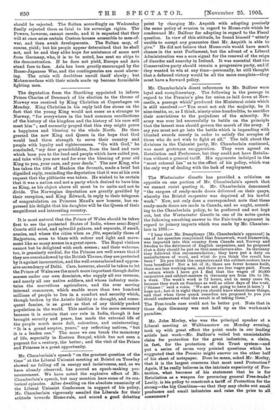It is most natural that the Prince of Wales should
be taken first to see the protected States of India, where semi-Royal Courts still exist, and splendid palaces, and separate, if small, armies, and where the cities when en. flue, especially those of Rajpntana, seem to blaze with colour and light and move- ment like so many scenes in a great opera. The Royal visitors cannot but be delighted with such scenes ; and their welcome, too, is genuinely cordial, for the Princes are well aware that if they are overshadowed by the British Throne, they are protected by it against insurrection, and the well-remembered and oppres- sive ascendency of Delhi. Care, however, should be taken to let the Prince of Wales see the much more important though duller masses under our own dominion, who supply all our revenue, and nearly all our native soldiers, and whose industry main- tains the marvellous agriculture, and the ever moving internal commerce, which enable more than two hundred millions of people to live in a comfort and security which, though broken by the Asiatic liability to drought, and conse- quent famine, is as great as that of any thickly packed population in the world. This caution is the more necessary because it is certain that our rule in India, though it has brought security and peace, has made the external life of the people much more dull, colourless, and uninteresting. "It is a grand sceptre, yours," say reflecting natives, "but it is a leaden one." The more we can break the monotony of life, especially in Eastern Bengal, which has not seen a pageant for a century, the better; and the visit of the Prince and Princess is a great opportunity. paradise.




















































 Previous page
Previous page